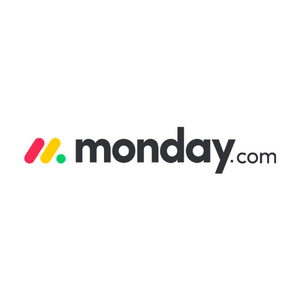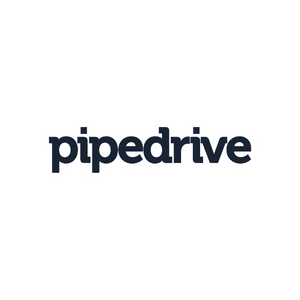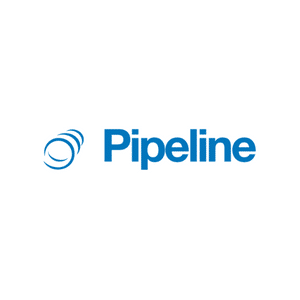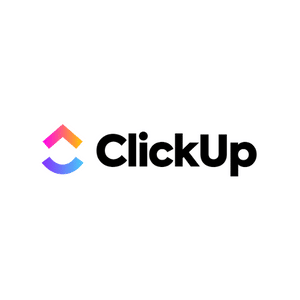Are you a startup looking for the best CRM software to manage customer relationships, boost sales, and optimize your business? Look no further!
I spent over a decade working with several startups, and we used many different CRM software, both good and bad, and the difference between the two will save you a ton of time and money!
So, the TYB team and I put together an in-depth guide to tell you which CRM for startups you should look into! How did we decide which CRM software to include?
- Credible user review
- Side-by-side feature comparisons
- A decade of industry experience
- Pricing plans flexibility
What are the Best Startup CRM This Year?
The world of customer relationship management software is constantly evolving, which makes it difficult to keep on top of what CRM for startups are still relevant for today’s market.
Not to worry, as the best CRM software changes for today..so do we! Here is our list of the best 8 CRM for startups in 2023.
- Monday.com
- Pipedrive
- Pipeline
- Zoho CRM
- ClickUp
- Insightly
- Leadjet
- Hubspot
Monday.com
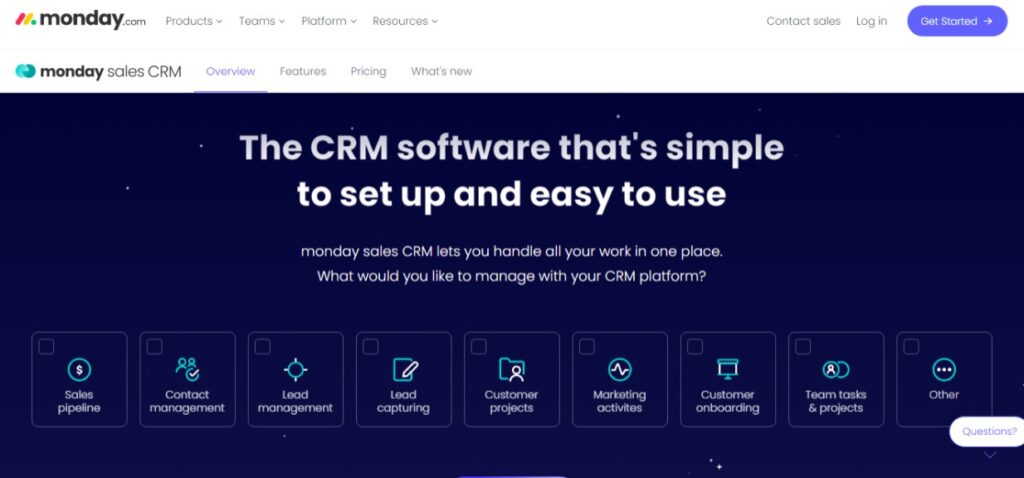
Why We Picked It
Monday.com is the perfect CRM for startups. It has all the features you need to manage strong customer relationships, boost sales, and optimize your business in one package. Plus, it’s incredibly user-friendly and easy to use!
It also offers great pricing plans with flexible options that are perfect for small businesses on a budget. And it has awesome customer support, making it one of the best CRM for startups out there.
Monday.com is definitely one of the top choices for CRM for startups in 2023. Give it a try and see how quickly your business operations become streamlined!
Pricing
As far as pricing goes, Monday.com has quite a few different pricing plans, including a free forever plan as well.
Individual Plan: This plan is free and comes with up to two team members, 1,000 leads, and web forms to capture leads.
Basic Plan: This plan costs $10 a month per seat and includes iOS & Android apps, unlimited free viewers, unlimited contacts, and customizable pipelines.
Standard Plan: This plan costs $14 a month per seat and will help automate sales processes and streamline communication. It also includes activity management, quotes & invoices, and custom CRM integrations.
Pro Plan: This plan costs $24 a month per seat and is targeted toward gaining insight into your entire sales cycle and forecasting. It also includes sales analytics, Google calendar, email tracking, and automation.
Pros
- User interface is very intuitive
- Platform helps you track customer interactions
- Large template library
Cons
- Reporting capabilities could be better
- UI can get bogged down if you have a lot of data
- Advanced crm features only available on more expensive plans
Pipedrive
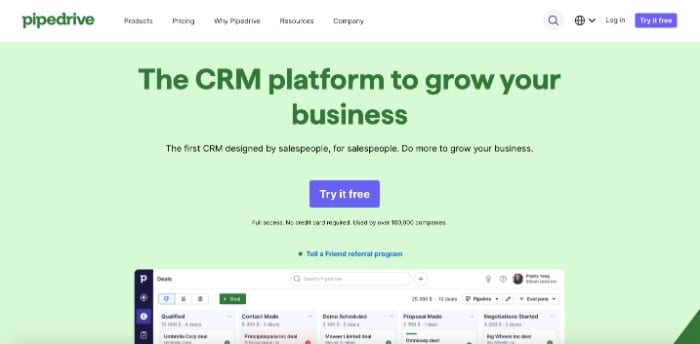
Why We Picked It
Pipedrive is a great CRM for startups. It offers a user-friendly interface, robust features, and affordable pricing plans. It also provides a 360-degree view of each customer which helps you understand their needs and better manage your customer interactions.
Pipedrive also has seamless integrations with various other apps like Google Calendar, Gmail, and Zendesk. This helps you save time and money by automating certain processes while also providing valuable insights into your marketing automation.
Pipedrive is the perfect CRM for startups who want to get more out of their contact management software with less effort.
Pricing
Pipedrive has plenty of pricing plans for the varying needs of startups. They also have a 14-day free trial.
Essential Plan: This plan is priced at $14.90 a month per user and comes with 24/7 support and 300+ integrations, and lead management.
Advanced Plan: This plan is priced at $24.90 a month per user and comes with click tracking, group emailing, and full email sync with templates.
Professional Plan: This plan is priced at $49.90 a month per user and comes with enhanced custom reporting, revenue projections, and create, manage and design contracts.
Pros
- Pricing plans are cheaper than other crm software
- Very good lead management
- Strong customer data
Cons
- Limited analytics
- Phone support only on most expensive plan
- Limited custom fields
Pipeline
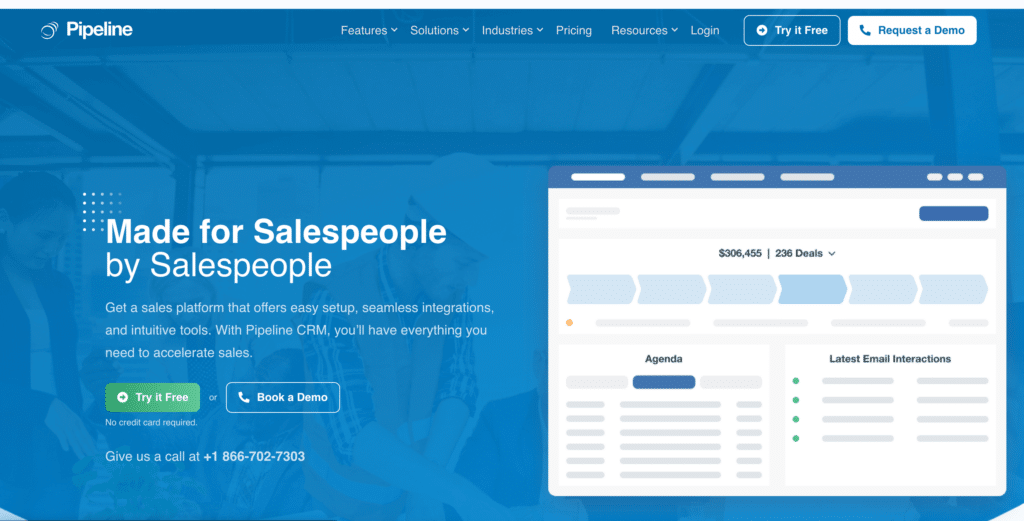
Why We Picked It
Pipeline is one of the best CRM for startups. It offers a simple interface and easy onboarding process, so anyone can get started using it in no time.
Pipeline also provides robust customer relationship management features such as lead tracking and automated email campaigns to help you maximize your sales potential.
Pipeline also integrates with many popular apps such as Slack, Salesforce, and HubSpot to help you streamline your business processes. Its customizable pipelines make it easy to create workflows for any kind of customer relationship management process.
They are the perfect CRM software for startups looking to get more out of their relationships with potential customers while also saving time and money.
Pricing
Pipeline has several different pricing plans available at your disposal. It also comes with a 14-day free trial.
Start Plan: This plan is priced at $25 a month per user when billed annually. With this plan, you receive one sales pipeline, unlimited file storage, 25 custom fields, and more.
Develop Plan: This plan is priced at $33 a month per user when billed annually. This plan includes two sales pipelines, 2500 deals per account, unlimited exports per user a month, and locked and required fields.
Grow Plan: This plan is priced at $49 a month per user when billed annually. This plan includes five sales pipelines, email templates and campaigns, Deal Intelligence Fields, and more
Pros
- Great for small businesses or mid-size
- Free trial available
- API integrations
Cons
- No free plan available
- Email marketing could be better
- Marketing automation can sometimes be difficult
Zoho CRM
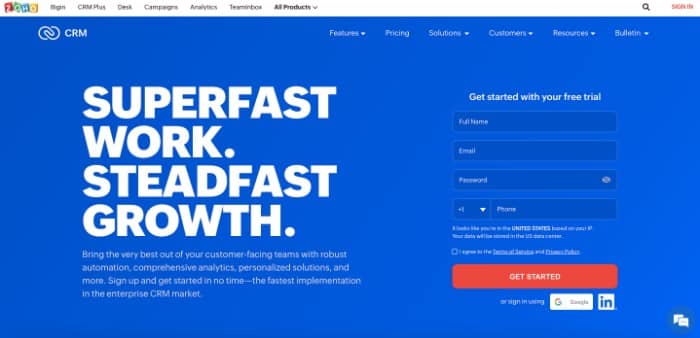
Why We Picked It
Zoho CRM is the perfect CRM for startups because it offers powerful features and a user-friendly platform. It also comes with an array of customizable options so you can tailor it to fit your business needs.
You have access to a variety of integrations, marketing automation, segmentation capabilities, and more. Zoho CRM also has an AI-powered assistant, Zia, to help you automate tasks and provide valuable insights into the customer journey.
Zoho CRM is a great choice for startups looking to get more out of their business processes while still being affordable.
Pricing
Zoho CRM has a free plan available along with several different affordable pricing plans.
Free Plan: This plan is available for three users and comes with standard reports and task-only reminders.
Standard Plan: This plan is $14 a month for each user and comes with 100 custom reports, 10 custom dashboards, and 20 schedulers per user.
Professional Plan: This plan is $23 a month for each user and comes with standard reports, unlimited custom reports, charts, and KPIs.
Enterprise Plan: This plan is $40 a month for each user and comes with unlimited custom dashboards, 10 trends for the anomaly detector, zia notification, and more.
Pros
- Pricing is cheap compared to other crm software
- Scalability allows for growth of your startup
- Intuitive and easy-to-use crm platform
Cons
- No individual email tracking
- AI assistant could be better
- Live chat option lags at times
ClickUp
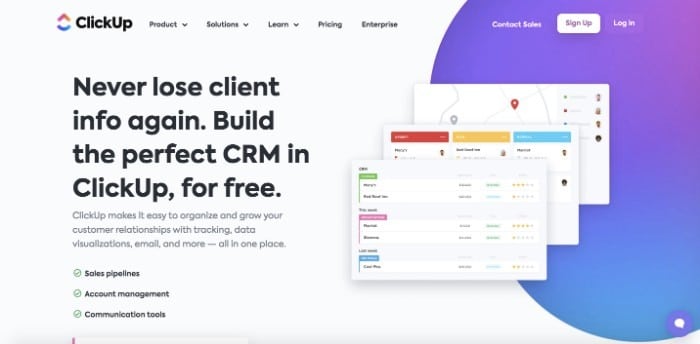
Why We Picked It
ClickUp is one of the best CRM for startups because it offers an incredibly user-friendly experience. It also has robust customer relationship management features such as automated emails, lead tracking, and more.
Its reporting capabilities allow you to see exactly how your customers are engaging with your business so you can make smarter decisions down the road. Plus, its mobile app makes it easy to track leads and stay on top of customer activity wherever you are.
ClickUp is the perfect CRM for startups looking to improve their sales process while also saving time and money.
Pricing
As mentioned above, ClickUp is tough to beat when it comes to pricing. When comparing CRM for startups, ClickUp has some of the cheapest pricing available.
Unlimited Plan: This plan is $5 each month per member and is great for small teams. This plan includes unlimited Gantt charts, resource management, unlimited storage, and agile reporting.
Business Plan: This plan is $12 each month per member and is best for mid-sized teams. This plan includes workload management, timelines, custom exporting, and production schedules.
Business Plus Plan: This plan is $19 each month per member and is best for multiple teams. You will get custom role creation, admin training webinars, custom permissions, and lead generation.
Pros
- Has employee and user-time tracking
- Great for organizing marketing campaigns
- Simple sales automation setups
Cons
- Perhaps too many key features can feel overwhelming
- Gantt chart functionality can be difficult to get used to
- Font and text themes can be difficult to read
Insightly
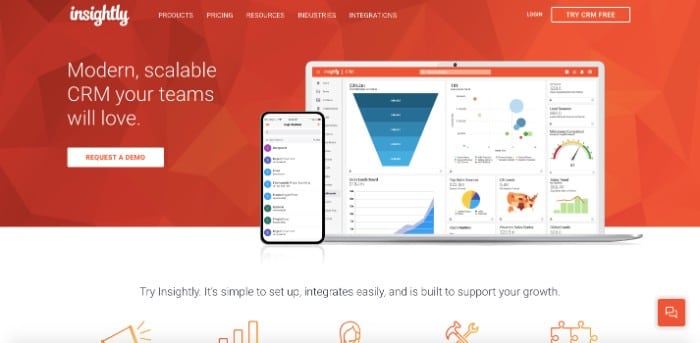
Why We Picked It
Insightly is one of the best CRM for startups because it provides a comprehensive customer relationship management platform with powerful features.
It includes everything you need to manage your customer relationships, such as automated emails and messaging, lead tracking, sales pipeline management, and more.
It also has an AI-powered assistant, called Insightly Bot, to help you automate tasks and provide valuable insights into the customer journey.
Plus, it has great pricing options so startups can get the features they need at a price that fits their budget.
Pricing
In terms of pricing plans, Insightly has a free trial, as well as several pricing plans.
Plus Plan: This plan is $29 a month per user when billed annually and includes lead management, opportunity management, real time data synchronization and more.
Professional Plan: This plan is $49 a month per user and includes email templates, web to lead capture, complete workflow automation, and more.
Enterprise Plan:This plan is $99 a month per user and includes native marketing and service integration, contact management, and unlimited real-time insight cards.
Pros
- Key features allow for sales workflow automation
- Great set of integration crm tools
- CRM Platform allows for improved customer retention
Cons
- Project management functions aren't very advanced
- No time tracking functonality
- Chrome extensions aren't great
Leadjet
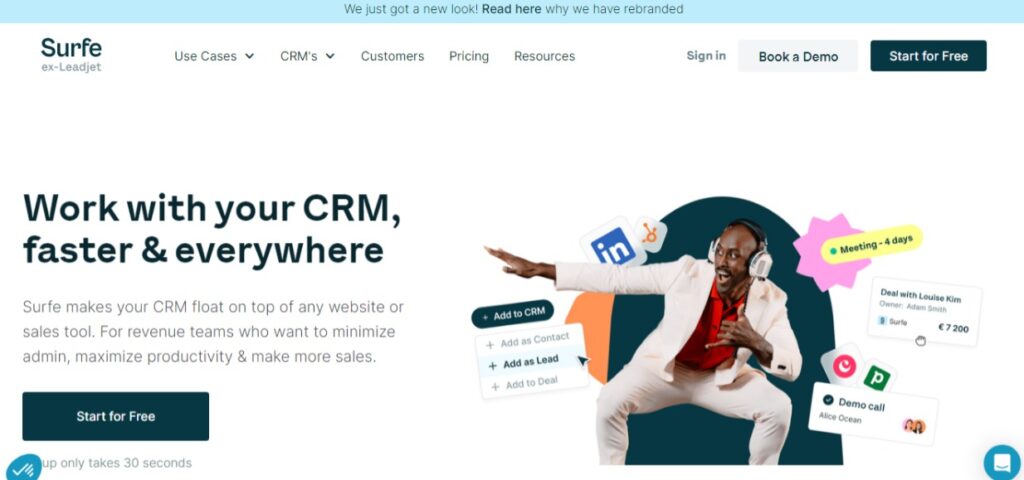
Why We Picked It
Leadjet is the perfect CRM for startups because it’s easy to use, yet packed with a robust set of features. It has an intuitive user interface that makes managing your customers and sales pipeline simple.
It also comes with automated contact management, lead scoring capabilities, and powerful reporting tools to ensure you’re on top of your customer relationships.
Plus, it has great pricing options so startups can get the crm features they need without breaking the bank.
Pricing
Leadjet has several pricing plans available including a free plan. They also have options for monthly or yearly payment plans.
Free Plan: This plan has features available such as, integrate crm with LinkedIn, view crm fields, and view notes and deals on Linkedin.
Basic Plan: This plan costs $23 a month per seat and has features available such as syncing messages, add contacts to crm, 1-click sync, and a sales navigator.
Professional Plan: This plan costs $29 a month per seat and has features available such as, auto sync, sales loft, email and video support custom email integrations.
Business Plan: This plan costs $59 a month per seat and has features available such as, notification of outdated contacts, account manager, and advanced analytics.
Pros
- Plenty of integration flexibility
- Option for monthly or yearly payment plan
- Free plan available
Cons
- Not available on Android or Iphone
- Free Plan has no advanced features
- Website design can be a bit confusing in areas
HubSpot
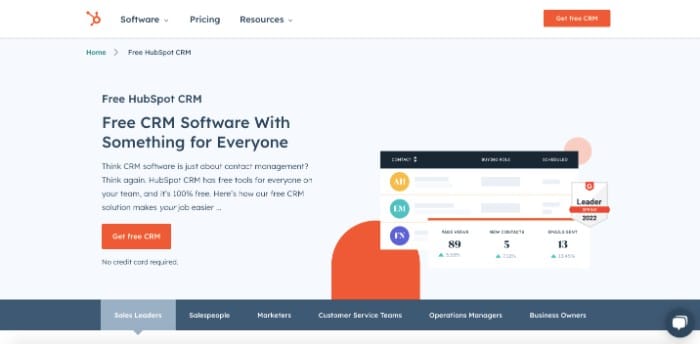
Why We Picked It
HubSpot CRM is one of the best CRMs for startups because it provides an all-in-one platform that has everything you need to manage customer service tools.
It offers a full suite of features such as automated emails and messaging, lead tracking, pipeline management, sales enablement tools, and more.
Plus, HubSpot’s AI-powered assistant, called Insightly Bot, helps you automate tasks and provide useful insights into the customer journey.
Also, it has great pricing plans that make it accessible for startups on any budget.
Pricing
HubSpot CRM has several pricing plans along with free tools such as conversational bots, live chat, team email, and more.
Starter Plan: This plan is $45 a month for two paid users and includes email and in-app chat support, simple automation, and meeting scheduling.
Professional Plan: This plan is $450 a month, but you receive five paid users, standard CRM integration, forecasting, and advanced phone support.
Pros
- Helpful lead generation tools
- Fully integrated
- Free crm tools
Cons
- Free plan is limited
- Gets expensive quickly
- Several crm features need management oversight
What is a Startup CRM Software?
CRM software for a startup is designed to help businesses of all sizes manage their customer relationships. It offers a full suite of features such as contact management, automated emails and messaging, lead scoring, workflow automation, reporting tools, and more.
By using startup CRM software, businesses can streamline their sales process and improve customer retention. It also allows companies to track leads and generate insights into their customer’s journey.
Overall, CRM software is a great tool for businesses of any size that are looking to improve their sales pipeline and grow their business.
What to Look for In a CRM for Startup Businesses?
When selecting a startup software for your business, there are several important factors to consider.
You want to make sure that the system is easy to use, has great customer support, and provides all the features you need to manage and track your customer data.
Additionally, you’ll want to look for a CRM with analytics tools and reporting, so you can get insight into your customers’ journey and make informed decisions about your sales process.
Here’s a more specific list of what we look for in a CRM for a startup business.
Project Management Tools
Project management tools are essential for any CRM software. The right tool should allow you to easily manage customer relationships, assign tasks to team members, and track progress on projects.
Customer Relationship Management
Customer relationship management (CRM) features should be a priority when looking for a CRM software. This includes contact management, pipeline tracking, and analytics that provide insights into customer journey.
The best crm platform should help streamline your startup, so you can focus on the important tasks!
Ease of Use
The last thing you want is a top crm software that is complex and takes forever to learn. Look for a CRM software with an intuitive user interface and straightforward navigation that makes it easy to use.
Marketing Automation Tools
Integrating your CRM with marketing automation tools can help you streamline lead generation and customer segmentation. Popular options include MailChimp, Salesforce Marketing Cloud, and Drift.
In addition to marketing automation, it’s important to look for a CRM software that integrates with other business applications such as accounting, invoicing, and more.
Sales Forecasting
Sales forecasting is essential for any startup business. The right CRM software should have predictive analytics that provide insights into customer trends and help you plan ahead.
This sales crm tool should help with everything from sales processes to the sales pipeline.
Lead Management
Lead management tools are essential for any startup business. The best CRM software should have lead scoring and tracking capabilities that help you identify qualified leads and prioritize them accordingly.
Task Management
Task management features are also useful for any startup business. The right sales crm should have task automation capabilities and workflows that enable you to assign tasks, set deadlines, and track progress.
Data and Analytics
Data and analytics features are essential for any CRM software. The right crm solution should have reporting capabilities that give you insights into customer journeys and help you track performance.
Integrations with Other Software
The most agile CRM should also be able to easily integrate with other business applications such as accounting, invoicing, and more. This will help streamline the workflow and make it easier for you to manage your customer relationships.
Robust Reporting
Finally, you want a CRM software that provides robust reporting and analytics capabilities. This will help you gain deeper insights into customer behavior and track performance.
How did We Review These CRMs?
We reviewed the top CRM for startups and evaluated them against a number of criteria including features, ease of use, integrations, data & analytics, and customer service.
We also looked at user reviews to ensure that the products we recommend are reliable and well-regarded.
When it comes to picking a CRM, there are many factors that goes into choosing which are perfect for a startup. Here are some of the factors.
Ease of Use
We reviewed each CRM based on its user interface and ease of use. We wanted to make sure that the software was easy to navigate and had an intuitive design.
After all, what’s the point of having a CRM system is no one on your team can use it? The right solution should be able to be used by sales and marketing teams as well as management.
Customer Support
We also looked at the customer support available for each CRM software. We wanted to make sure that the software had helpful customer service, and that it was accessible 24/7.
The best CRM solution should have a dedicated team of customer support professionals ready to answer any questions you may have.
Customer interaction is one of the main focal points of an experience for a customer regarding any business!
Pricing
Next, we looked at the pricing of each CRM software. We wanted to make sure that the pricing was fair and that it suited your budget.
When looking for a CRM software, you should keep an eye out for key features such as free trial periods and discounts. This will help you find the best CRM solutions for your business operations.
Feature sets
We also assessed the feature sets of each CRM software. We wanted to make sure that the CRM had all the features you need, such as task automation, lead scoring, sales forecasting, and integrations with other business products.
The right software should have everything you need for effectively managing customer data and help your business succeed.
Customization
We also looked at the customization options available for each CRM. We wanted to make sure that you could customize the software to fit your business needs and preferences.
The best CRM software should have features such as custom fields and reporting capabilities so that you can tailor the system to your unique requirements.
Other 3rd-Party Reviews
Finally, we looked at other 3rd-party reviews for each CRM software. We wanted to make sure that the software had a good reputation and was reliable.
We combed through customer ratings and feedback so that you can find the best CRM solution for your business. Customer satisfaction should be important for all startup businesses.
Startup CRM Wrap Up
In summary, when reviewing a CRM for startups, there are many factors to consider.
The right software should be easy to use, have customer support available 24/7, be affordably priced and offer the features you need such as task automation, a strong sales pipeline, and more.
Plus, it should have customization options so that you can tailor it to your unique needs and have a good reputation, as judged by other 3rd-party reviews.
By considering all of these factors, you can be sure you’ll find the best CRM solution for your startup business.
We’d like to hear from you! Let us know what you think of our list. Do you have any experience with CRM for your startups? Leave a comment and tell us your thoughts!
FAQs about topic
Ultimately, the best CRM software for startups should have features such as task automation, lead scoring, integration with other business apps, and robust reporting capabilities.
Additionally, the CRM should be easy to use, affordable, and have a good customer service team.
Finding the right CRM is an important step in making sure that your startup succeeds.
Yes, startups need CRM software. A good CRM system can help you manage customer data and relationships more efficiently.
It can also help streamline the workflow for the sales process and marketing campaigns, as well as offer insights into customer relations and performance metrics.
A good CRM for small businesses should have features such as marketing automation capabilities, customer data, pipeline management, and integrations with other business apps.
The CRM should also be easy to use and offer customer service that is available 24/7. Additionally, it should be affordable and have customization options so that you can tailor the system to your business needs.
With the right CRM tool, small business can easily manage customer relations and optimize their workflow for greater success.
To implement a CRM into your startup, you first need to understand what features are most important for your business.
Once you have identified those features, choose the best software that meets your requirements. Make sure it has all the necessary features, pricing fits within budget and is easy to use.
Then start exploring the system and customize it to fit your business needs.
Finally, create a plan for user onboarding and training so that everyone in the team is properly trained on how to use the CRM software.
With the right implementation strategy, you can make sure that your startup reaps all of the benefits of using a CRM system.
The 4 P’s of CRM include People, Processes, Platforms, and Performance.
People are the main focus of any CRM system, as it requires employees to use the software for it to be effective.
Processes refer to the workflow that supports customer relations in a business.
Platforms refer to the technology used for the CRM system.
Performance refers to the metrics that measure customer satisfaction, such as sales revenue, customer retention rates, and average order value.
By understanding these 4 P’s of CRM, businesses can better understand why a CRM tool is important for a successful CRM implementation.

